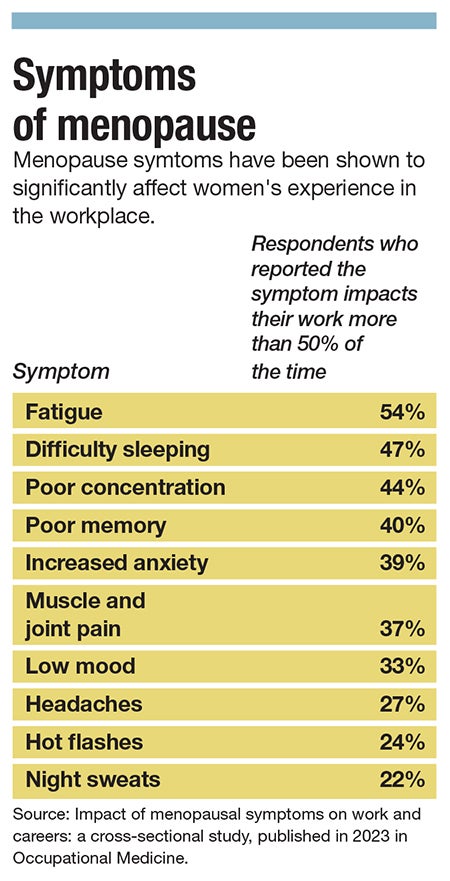Workdays missed due to menopause symptoms added up to another $1.8-billion annual loss.
Get Instant Access to This Article
Subscribe to Worcester Business Journal and get immediate access to all of our subscriber-only content and much more.
- Critical Central Massachusetts business news updated daily.
- Immediate access to all subscriber-only content on our website.
- Bi-weekly print or digital editions of our award-winning publication.
- Special bonus issues like the WBJ Book of Lists.
- Exclusive ticket prize draws for our in-person events.
Click here to purchase a paywall bypass link for this article.
All women, if they outlive their ovaries, will go through menopause. Yet, the message women receive directly and indirectly is the workplace is no place to talk about this stage of their lives.
The subject remains taboo, with women frequently left to suffer in silence.

“Menopause is a universal life experience, but it's also tied to the aging process. And so I think you have the intersection of sexism and ageism that are playing a role here,” said Dr. Stephanie Faubion, director of the Mayo Clinic’s Center for Women’s Health and the medical director of The Menopause Society.
The loss of productivity and health expenses associated with menopause cost the U.S. economy $26 billion annually, according to conservative figures developed from research by Faubion and her colleagues.
Workdays missed due to menopause symptoms added up to another $1.8-billion annual loss, according to the 2023 study Impact of Menopause Symptoms on Women in the Workplace published in the Mayo Clinic Proceedings.
Faubion and her peers see the fog of silence starting to lift surrounding menopause and how it shows up in the workplace: a necessity if women are going to receive the adequate support they need, which in turn, helps businesses thrive.
Small adjustments such as more frequent work breaks and flexible dress code policies can go a long way in making working conditions more conducive to those in menopause.
While workplace accommodations for the physical and mental effects of menopause are essential, they can only be sustainable when rooted in a culture that prioritizes accurate knowledge, informed accessibility, and support, rather than one that penalizes women for speaking up, said Valerie Zolezzi-Wyndham, CEO of Promoting Good, a diversity, equity, and inclusion leadership consulting firm in Worcester.
Lack of understanding
Menopause and its symptoms are not well understood on a clinical level, and the effects of that trickle down to the workplace, said Zolezzi-Wyndham.
“You can't talk about something you don't understand,” she said.
Historically, treating menopause has largely fallen on the shoulders of gynecologists, since even primary care providers often aren’t discussing the transition with their patients, said Dee Henriquez, nurse practitioner and owner of Dee Luxe Medical, a Worcester clinic providing hormone replacement therapy for those in menopause.
“We should all be well versed in how to manage 50% of the population with their hormone fluctuations, right?” Henriquez said.
While menopause typically begins between 45 and 55, women can start the transition period, called perimenopause, as soon as 35.
Progesterone is the first hormone to begin to decline, said Henriquez. Since progesterone has mood stabilizing effects, its decline can cause women to experience heightened anxiety, at levels they may have never felt before.
Henriquez has seen patients who have been sent to up to seven specialists, from psychiatrists to cardiologists, before they find their symptoms are actually a result of menopause.

Unexplained changes like anxiety, stress, brain fog, and memory struggles stemming from menopause can cause insecurity in women, especially when they’re in professional settings, said Zolezzi-Wyndham.
“The lack of understanding of what might be happening can impact both how a woman feels about herself, but also how other people might experience her,” she said.
Those in menopause are usually entering or already in positions of power: women aspiring to break the glass ceiling of opportunity who are worried about speaking about or asking for anything that might make them look weak, she said.
“It could be similar to some of the taboo that exists around asking for reasonable accommodations for people with disabilities. If you ask for this accommodation, women worry, people with disabilities worry, that their excellence might be questioned,” Zolezzi-Wyndham said.
Faubion has had many of her patients say they feel they can’t do their jobs or they’re going to quit because of how pervasive their menopause symptoms are, including a patient who was the chief medical officer of a major global conglomerate.
“If she is feeling that way, imagine all the other people who maybe don't even know that these symptoms relate to menopause,” said Faubion.
In fact, two out of five women considered finding or found a new job due to menopause, according to a study published in January 2024 by the Washington, D.C.-based Society for Women’s Health Research. The study found one in four women considered not pursuing or didn’t pursue a leadership opportunity, and one in three considered reducing or reduced their workload.
Luckily, Faubion is seeing a generational shift in which women are feeling more empowered to talk about their reproductive health openly. Baby Boomers were not talking about menstruation, lactation, or pregnancy, but that’s beginning to change.
“Now you have the Gen Xers and the Millennials who are much more likely to talk about something like that, and not only to talk about it, but to be on social media about it and to crowd source for solutions,” said Faubion.
Bi-directional impact
Menopausal symptoms typically fall into one of three domains: somatic, psychological, genitourinary, said Faubion. Somatic symptoms include those such as hot flashes, night sweats, and sleep disturbance. Psychological symptoms can include increases in anxiety and depression. Genitourinary symptoms can include frequent urination and vaginal dryness.
All of these symptoms independently were associated with adverse work outcomes throughout Faubion’s research.
“Women may not be as productive,” she said. “They may not go to work in the first place that day; that's absenteeism. They may go to work and not perform up to their usual standard; that's called presenteeism, when they show up and they shouldn’t be there.”

Sleep troubles and insomnia most impact Henriquez’s patients’ work and their performances. She treats patients who experience lesser-known symptoms such as heart palpitations and sudden, generalized joint pain.
Henriquez herself has had first-hand experience going through perimenopause, dealing with significant sleep disturbances and brain fog. A once solid sleeper, she all of a sudden began waking up at 3 a.m., unable to fall back asleep.
“Then the next day, I felt like I was dragging,” she said. “It would be that thing where I'd read the same sentence 12 times, not understanding, retaining the information. And for me, working with patients, that's very pertinent.”
Faubion sees menopause and the workplace as having a bi-directional relationship, with some aspects of work affecting menopause and the other way around.
Accommodating menopause in the workplace
Different kinds of physical accommodations are needed for those in menopause for jobs throughout various industries and environments, according to The Menopause Society.
The report recommends physically demanding jobs, or ones that take place outside, should afford women a flexible dress code policy along with access to cold water and cooling areas. For jobs that are more stagnant and/or emotionally draining, it's recommended to allow for flexible hours and remote work options when possible.
Beyond physical accommodations, Henriquez recommends companies and organizations incorporate more women’s health resources and programs into their health and wellness benefits.
Workplaces don’t even necessarily need separate policies pertaining to menopause, though it wouldn’t be inappropriate for them to do so, said Faubion. She encourages employers to connect the dots for employees so they know supportive menopause services are out there and covered, including mental health support and medications and treatments.
If employers aren’t aware of what benefit services are available for their employees experiencing menopause, Zolezzi-Wyndham said it’s important to ask their benefits providers and examine their packages.
“The best workplaces are going to improve their systems to provide that flexibility or that accommodation proactively, as opposed to reactively … so that it doesn't become about a woman who has a specific challenge right in this moment,” she said.
Having the right work culture around menopause and accommodation is important, as specific people may need specific accommodations they can get only receive by asking, she said.
“The more that we normalize that it's okay to talk about these things, the more that people are going to be comfortable asking for what they need,” said Zolezzi-Wyndham. “What are you doing to create an environment where the person can ask for what they need, and also, what are you doing to invite that somebody to share?”
Women are now working well past menopause and have really productive years ahead of them, said Faubion. Employers accommodating them during that time is beneficial for everyone.
“These are your most experienced workers. They've got institutional knowledge. They are probably your most valuable employees,” she said.
Mica Kanner-Mascolo is a staff writer at Worcester Business Journal, who primarily covers the healthcare and diversity, equity, and inclusion industries.

